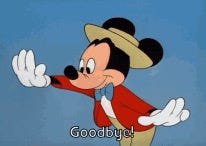Time to Say Goodbye to Iger
Disney's Timid Titan Bows Out Amid Trump's Media Storm, Leaving Free Speech in the Lurch
As FCC Chair Brendan Carr's merger-tied threats propel ABC's suspension of Jimmy Kimmel into a chilling precedent, Disney CEO Bob Iger's refusal to fight back—opting for silence amid comedian outcries and local news perils—exemplifies executive timidity in the face of governmental vendettas, where politicians ride along without resistance, intimidation thrives only on fear, and dissenting voices like Colbert risk homelessness in a media landscape veering toward propaganda, underscoring a divided nation's vulnerability to coerced silences and uncalled bluffs:
The absurd backlash ignited when Kimmel's quip turned toxic. Jimmy Kimmel's monologue wrongly linking Charlie Kirk's September 10, 2025, assassination to MAGA ignited fury, cratering ratings, sparking boycotts, and prompting Nexstar-Sinclair affiliate pullouts over threats, forcing ABC's indefinite hiatus—a pathetic yet infuriating escalation that demands scrutiny of free speech's fragility.
Carr executed a shakedown scheme through regulatory leverage on mergers. Broadcasting on Benny Johnson's podcast, Brendan Carr dangled FCC approvals over Nexstar's $6.2 billion Tegna merger, pressuring affiliates to sideline Kimmel— a corrupt fusion of resentment and power that blurs state coercion with private decisions, violating First Amendment lines.
Iger's cowardly capitulation unfolded as he folded without a fight. Once an icon of savvy leadership, Bob Iger greenlit the suspension with Dana Walden, dodging interviews and drawing fire as "shameful" and "out of control" from critics like Michael Eisner—exposing Disney to potential lawsuits, yet failing to call Trump's bluff by taking it to court, kicking the can down the road, as intimidation only works if you're intimidated; what could Trump truly do to a diversified giant like Iger?
Trump's selective liberty revealed vows that ring hollow amid vendettas. Trump's inaugural promise to end censorship clashes with his backing of Pam Bondi's hate speech pursuits and license-yanking threats for "bad publicity," testing networks, universities, and firms—yet Iger's fold hands keys to this regime, where pulling local ABC signals would alienate everyday viewers tuned to SEC football or routine shows, begging the question: do they really want their local ABC taken down over Trump's whims?
Political passivity persists as leaders ride the revenge train. Republicans remain silent, unwilling to cross Trump on motivating issues like media revenge—they've signed up for this ride, as seen in their muted response to Bondi's backpedal, leaving Democrats alone in demanding Carr's resignation while non-politicians step up.
Comedians speak out as Tim Dillon and Andrew Schultz break ranks. In a rare pushback from MAGA-aligned figures, comedians Tim Dillon and Andrew Schultz have publicly condemned Kimmel's suspension as an overreach on free speech, with Dillon calling it "pathetic censorship" on his podcast and Schultz echoing on social media that "comedy shouldn't bow to threats," encouraging a broader coalition to resist and potentially fracturing support among late Trump adopters.
Dissent's defiant voices emerge as comedians lead the charge. As politicians cower, it's time for broader pushback; comedians are speaking out against the chill, rallying a coalition beyond MAGA, including Silicon Valley's Rogan allies radicalized by COVID censorship—potentially fracturing Trump's support if they demand genuine free speech.
Local news faces peril from propaganda in the heartland. Sinclair's Kirk tribute special in Kimmel's slot across 185 stations in 86 markets alarms with studies showing rightward shifts post-acquisitions, turning local broadcasts into Fox-Newsmax echoes—especially worrying for viewers not plugged into political debates, who rely on 5 PM news without grasping the manipulation.
The exile of critics intensifies with streamers' reticence and Colbert's uncertain future. Streamers shun anti-Trump projects, wary of repercussions, leaving figures like Stephen Colbert wondering where to find a home if targeted next alongside Fallon or SNL—compounded by Obama's rebuke of this "new and dangerous" cancel culture, urging resistance before autocracy solidifies.
Iger's surrender—cloaked in corporate prudence but rooted in fear—epitomizes a democracy where bluffs go unchallenged and spines bend easily, a stark betrayal by a leader once hailed as visionary but now exposed as timid in the face of authoritarian bluster. In Trump's era of reprisals, the survival of our liberties hinges on whether executives like Iger grow a backbone, voices unite to step up, and legal fights expose the hollow threats, or if the chill deepens into irreversible silence—it's time to say goodbye to Iger, whose capitulation not only undermines Disney's legacy but accelerates the erosion of free expression. Let the resolve to resist carry the day, reclaiming the narrative from cowards and coercers alike.


This breakdown is brutal, clear, and necessary. You didn’t just explain the situation you exposed the fear, cowardice, and stakes behind it. The way you highlight Iger’s silence as a symptom, not just a misstep, really drives home how fragile free expression can be in the hands of timid leadership. This is the kind of analysis that demands attention. ✨